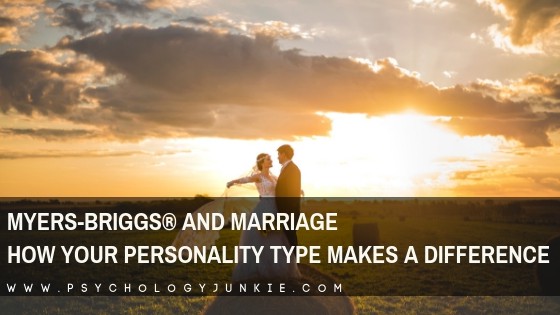Myers-Briggs® and Marriage – How Your Personality Type Makes a Difference
Does your Myers-Briggs® personality type impact your marriage? Do you ever feel like your partner just doesn’t “get” you or you don’t understand them? Today we’re going to take a look at some of the most frequent problems that occur in relationships between different types. Because this could get extremely complex we’re going to start simple and focus on the differences related to the dichotomies (I/E, S/N, T/F, J/P) of type.
Not sure what your personality type is? Take our new personality questionnaire!

Table of contents
Estimated reading time: 11 minutes
Myers-Briggs® and Marriage – How Your Personality Type Makes a Difference
Extroversion and Introversion in Couples
In various studies about type and relationships, there seem to be more marriages between extroverts and introverts than like couples (E/E, or I/I). However, these marriages also tend to have more problems than type-alike marriages.
Introverted and extroverted couples are often drawn together because they see something in the opposite partner that balances them out. The introvert, more reclusive, is often attracted to the energy and gregariousness of the extrovert. They don’t have to work as hard to get conversation going and they feel attracted to the characteristics that stand in contrast to their own. The extrovert, in turn, can find the introverts quiet, reflective nature comforting or mysterious. The only problem is that after the initial sparks have died down, these differences can start to create discord or frustration. The introverted spouse may feel depleted by the extroverted spouse. The extroverted spouse may feel ignored by the introverted spouse.
According to Carl Jung, extroverted individuals need to “process and interact with others to communicate their feelings and/or ideas. Introverts have to reflect, to process and sort out internally” If either of these processes is dismissed then naturally the partner who is being dismissed will feel resentment and bitterness with their partner.
Tips for E/I Blended Couples:
If you’re in an introvert/ extrovert relationship, here are some tips to keep you from running into problems:
- Recognize each other’s needs. Extroverts need to process externally. Introverts need to process alone most of the time. As much as possible, try not to “force” your own way onto your partner.
- Introverted partners who can get a brief period of alone time after coming home from work are able to respond much better to personal interaction afterwards.
- Introverts, remember that extroverts need personal connection and outward processing more frequently. Not allowing them to do this can make them feel excluded and repressed. Give them time each day to express their needs, feelings, thoughts, and decisions out loud.
- Extroverts, realize that introverts need time alone to process information before talking things over. Allow them some quiet time to reflect before expecting an immediate reaction to something. If you push for an immediate reaction, you both might regret it later.
Benefits for E/I Blended Couples:
- Extroverts can help introverts to experience more of the outside world and what it has to offer.
- Introverts can help extroverts to slow down and reflect before taking an action.
- Extroverts can help introduce introverts to a variety of friends they might not otherwise have met.
- Introverts can help remind extroverts to tend to their own individual needs.
Sensing and Intuition in Couples
Typically, Sensing-Sensing couples tend to get along very well. Based on a 1981 study in the Journal for Psychological Type, Sensing-Sensing couples reported less problems in their marriages than Intuitive-Sensing or Intuitive-Intuitive relationships. Intuitive-Intuitive relationships reported the most problems of all the combinations. According to Ruth G. Sherman who conducted the study, “One factor that may contribute to these results may be a reflection of a sensing type’s sense of humor on the difficulties that are bound to occur when two people live together. A sense of humor can keep minor irritations from becoming major obstacles. Another contributing factor may be that intuitives experience a higher level of expectation than sensing types do. Sensing types tend to be practical, realistic, and matter-of-fact, whereas intuitives tend to be more idealistic and imaginative, and to focus on the satisfactions the future will bring. Imagination and idealism can create unrealistic fantasies that no mate could possibly satisfy, and unmet expectation results in disappointment and dissatisfaction.” Sherman also hypothesized that because intuitives tend to dislike nitty-gritty detail work and chores, two intuitive partners together might find themselves resenting whichever partner avoids the bulk of that kind of work.
All this taken into consideration, your personality type certainly doesn’t dictate how happy you’ll be in a relationship. These are just some stumbling blocks to look out for on your relationship journey.
Problems occur in sensing-intuitive relationships when the two partners see a situation from completely different perspectives. Intuitive types look for implications, underlying meanings, and connections. Sensing partners look at what is provable, real, and tangible. Intuitive partners can inadvertently make sensing types feel unimaginative and dull, even if they are not. Sensing partners can make intuitive partners feel impractical and inattentive, even when they are not. The truth is, intuitives are attentive to different things than sensing types are. Sensing types are not dull or uncreative, they simply prefer to work with tangible objects and draw from experience rather than an idealistic image in their mind.
Couples in sensing/intuitive relationships tend to disagree about which information is relevant in a decision. Intuitives tend to make “leaps” based on abstract connections, whereas sensing types will want more tangible data. Intuitives also tend to project into the future more than sensing types, who prefer to stay grounded in the present. An intuitive may spend hours daydreaming about what could happen someday, while a sensor tries to pull them back towards what’s happening now. The intuitive, in contrast, may try to pull the sensor towards the future and away from the now as much as possible.
Understanding the differences between sensing and intuition can help couples to avoid misunderstandings and arguments. I wrote an article about sensing/intuitive blended relationships here that can be helpful in this regard.
Tips for S/N Blended Couples:
- Go out of your way to appreciate each other’s strengths. Compliment each other. Intuitives, praise your sensing partner’s observance to detail and realistic perspectives. Sensors, praise your intuitive partner’s insight and imagination.
- Avoid “superior” thinking. When you find yourself looking down on your partner because they missed something that seemed obvious to you, avoid rubbing their face in it. Remind yourself of that they are wired to notice different information than you are.
- Sensors, remember that intuitives tend to forget specifics and details more quickly than you do. Their minds are programmed to notice connections, possibilities, and implications much more than details, facts, and specifics.
- Intuitives, remember that sensors tend to struggle with noticing abstract connections and implications and are more conscious of specifics, details, and experiences.
Benefits of a Sensing/Intuitive Blended Relationship:
- Sensors can help intuitives to stay more grounded in reality and the present moment.
- Sensors can help intuitives to see the realities of the current situation.
- Sensors can quickly apply real-world experience to a problem.
- Intuitives can bring up unusual possibilities and solutions that the sensor might miss.
- Intuitives can realize future trends and implications that should be taken into consideration.
- Intuitives can focus on long-term goals and use their insight to circumvent potential obstacles.
Thinking and Feeling in Couples
Thinking and feeling blended couples experience many positives. They can balance each other out and make wiser decisions if they work to understand and respect each other’s preferences. However, there tend to be struggles in these relationships because of disagreements in decisions.
Based on a 1981 study of 160 couples, men living with thinking women reported fewer problems in almost all areas; and women living with feeling men reported fewer problems for eight of twelve problem-areas. This may have to do with the fact that a larger percentage of thinking males (roughly 55-67% of the US population) exist. Women are predominated by feeling types as well, with 65-76% of the US population composed of feeling women. Because of this, feeling women with feeling men and thinking men with thinking women are likely to find more consensus on decisions.
When a couple differs on Thinking and Feeling, they can have major disagreements on decisions. The thinking partner will value an objective approach; considering pros and cons, logic, facts, truth. The feeling partner will value a people-oriented approach; considering personal implications, ethics, and values. Thinking partners can find feeling types overly-sensitive or illogical, whereas feeling types can view thinking types as uncaring, callous, or hyper-critical.
Tips for T/F Blended Couples:
- Thinking types should show appreciation before giving criticism. This will help the criticism not to sting as harshly.
- Thinking types, refrain from giving criticism too freely. Pause and reflect on whether the criticism actually matters and is necessary.
- Feeling types, try to express your desires and wishes directly. Don’t assume your partner will automatically know what you need or want.
- Feeling types, recognize which critical comments are coming from a place of impersonal observation and which are meant to be hurtful. Realize that just as it’s natural for you to express your feelings or values, it’s natural for thinking types to point out things that strike them as illogical or inefficient.
Benefits of a Thinking/Feeling Blended Relationship:
- Feeling types can help thinking types to predict how others will react or feel.
- Feeling types can help thinking types to realize when compromise is necessary.
- Feeling types can organize people and tasks to work harmoniously.
- Feeling types can provide exceptional warmth and appreciation in the relationship.
- Thinking types can help feeling types to analyze the logical consequences of a decision.
- Thinking types can help feeling types to stand firm for their principles and policies.
- Thinking types can help feeling types to devise rational systems.
- Thinking types can help feeling types to cut through the emotional implications and see the objective truth of a situation.
Judging and Perceiving Couples
Having a plan and a sense of order is very important to Judging types, whereas spontaneity and freedom are very important to Perceiving types. These preferences can create tension in relationships between Judging and Perceiving partners. Alternatively, Judger-Judger relationships can become too rigid in their routine or plan, and Perceiver-Perceiver relationships can encounter problems when both partners procrastinate too freely.
Based on a 1981 study of 160 couples, Perceiving mates of Judging individuals reported more problems than average, regardless of which partner was male or female. This had to do with the fact that Judging individuals tended to organize their world and seek closure which made Perceiving types feel controlled or pushed into decisions before they were ready. The study stated that this was particularly a problem for NPs, who expressed the strongest need for freedom. Perceivers may resent Judging partners or Judging partners can become bitter towards perceiving partners who are reluctant to stick to a plan. According to various studies, two Judging individuals in a relationship appear to be more satisfied in their relationships, and two Perceiving individuals show more satisfaction as well. That said, there are many happy J/P blended couples in the world, and mixing the two preferences can create more balance in a relationship.
Tips for J/P Blended Couples:
- Learn about each other’s personality types and try to respect each other’s needs. Judgers should try to be more patient with the Perceiver’s need for alternatives and options. Perceivers should try to be more conscious of the stress it causes Judgers to have things left undecided. It’s important for both partners to work on this together. If only one partner is doing their part then this can lead to resentment and frustration.
- Judgers, realize that Perceivers will need more time to explore their options before making a decision. Try not to expect a spur-of-the-moment answer to a serious question.
- Perceivers, realize that Judgers will feel overwhelmed when there isn’t a structure to their day or a clear plan for their future. Try not to leave everything undecided for too long. Try to let them know ahead of time what to expect.
- Judgers, realize that Perceivers like to mix work with play and sprint to finish a project at the end.
- Perceivers, realize that Judgers like to do all their work before they play. They can’t relax when projects are left unfinished.
Benefits of a Perceiving/Judging Blended Relationship:
- Judgers can help Perceivers to outline the details of their plan.
- Perceivers can help Judgers to see creative angles and possibilities that would have been missed in a rush to complete something.
- Judgers can help Perceivers to come to a decision when they are overwhelmed by alternatives.
- Perceivers can help Judgers to relax and focus on the possibilities in the present moment.
What Are Your Thoughts?
Did you enjoy this article? Do you have any thoughts or insights to share? Let us know in the comments!
Find out more about your personality type in our eBooks, Discovering You: Unlocking the Power of Personality Type, The INFJ – Understanding the Mystic, and The INFP – Understanding the Dreamer. You can also connect with me via Facebook, Instagram, or Twitter!

Other Articles You Might Enjoy:
What Each Myers-Briggs® Personality Type Needs in a Relationship
When Sensors and Intuitives Fall in Love – A Guide for a Thriving Relationship
Here’s What You’re Like as a Friend, Based on Your Myers-Briggs® Personality Type
Sources:
The MBTI® Manual – Third Edition. Pages 240-245
Research in Psychological Type, Volume 4, 1981 – Typology and Problems in Intimate Relationships
Just Your Type: Create the Relationship You’ve Always Wanted Using the Secrets of Personality Type













Super accurate!
This article is totally fascinating, and I find it to be accurate down to a science. I wish I had read this during an old relationship, it would have made such a difference. And now it helps me understand my current relationship as well.
Thanks for the insights!
Thanks , I’ve recently been searching for information approximately this topic for a while and yours is
the best I have discovered till now. However, what about the bottom line?
Are you sure about the supply?
I’m an ESPN
I appreciate that this article doesn’t take the typical approach to applying Types to relationships. I think the traditional approach is based on a possibly outmoded expectation that in our youth we choose opposites who can fill in our missing pieces, and with maturity we long for more overlap. I suspect that today young people have a gentler inner relationship with their shadow side, and look less for a partner to fill in the gaps. If that’s true, I would expect younger people to choose partners with more overlapping letters. What do you think?
INFJ here, married to an ENFP! I found this article so helpful in laying out the details of what each type brings to the table. I have always found myself to be more attracted to Extroverts, by the way. My husband and I have enough similarities and at the same time enough differences that it works well. I’ve never wanted someone to be my twin. I enjoy our differences and I think it stretches us as individuals. The Introvert/Extrovert and Judging/Perceiving details really helped verbalize what I think we feel when relating to one another.
Thank you so much for the tips on being married to your opposite. They are a wonderful reminder to look for the positives in each other’s abilities instead of being flooded with frustration and hurt. It’s not personal, it’s just who we are and how we’re wired. 🙂